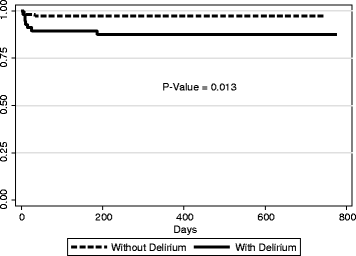Hypertension, mitral valve disease, atrial fibrillation and low education level predict delirium and worst outcome after cardiac surgery in older adults
- PMID: 29390969
- PMCID: PMC5796436
- DOI: 10.1186/s12871-018-0481-0
Hypertension, mitral valve disease, atrial fibrillation and low education level predict delirium and worst outcome after cardiac surgery in older adults
Abstract
Background: Delirium is a common complication after cardiac surgery in older adult patients. However, risk factors and the influence of delirium on patient outcomes are not well established. We aimed to determine the incidence, predisposing and triggering factors of delirium following cardiac surgery.
Methods: One hundred seventy-three consecutive patients aged ≥60 years were studied. Patients' characteristics and two cognitive function assessment tests were recorded preoperatively. Perioperative variables were blood transfusion, orotracheal intubation time (OIT), renal dysfunction, and hypoxemia. Delirium was assessed using the Confusion Assessment Method for the Intensive Care Unit. The composite outcome consisted of death, infection, and perioperative myocardial infarction until hospital discharge or 30 days after surgery, and for up to 18 months.
Results: One hundred six patients (61.27%) were men and the age was 69.5 ± 5.8 years. EuroSCORE II index was 4.06 ± 3.86. Hypertension was present in 75.14%, diabetes in 39.88%, and 30.06% were illiterate. Delirium occurred in 59 patients (34.1%). Education level (OR 0.81, 0.71-0.92), hypertension (OR 2.73, 1.16-6.40), and mitral valve disease (OR 2.93, 1.32-6.50) were independent predisposing factors for delirium, and atrial fibrillation after surgery (OR 2.49, 1.20-5.20) represented the potential triggering factor. Delirium (OR 2.35, 1.20-4.58) and OIT ≥ 900 min (OR 2.50; 1.30-4.80) were independently associated with the composite outcome.
Conclusions: In older adult patients submitted to cardiac surgery, delirium is a frequent complication that is associated with worst outcome. Independent risk factors for delirium included education level, hypertension, mitral valve disease, and atrial fibrillation after cardiac surgery.
Keywords: Cardiac surgery; Delirium; Elderly; Illiterate; Incidence.
Conflict of interest statement
Ethics approval and consent to participate
Local ethical committee (Comissão de Ética para Análise de Projetos de Pesquisa – CAPPesq from Hospital das Clínicas da Faculdade de Medicina da Universidade de São Paulo) has approved the protocol under the number 825/11. Written informed consent was obtained from all patients according to international guidelines.
Consent for publication
Not applicable.
Competing interests
The authors of the present study declare that they have no competing interests.
Publisher’s Note
Springer Nature remains neutral with regard to jurisdictional claims in published maps and institutional affiliations.
Figures
References
Publication types
MeSH terms
Grants and funding
LinkOut - more resources
Full Text Sources
Other Literature Sources
Medical



